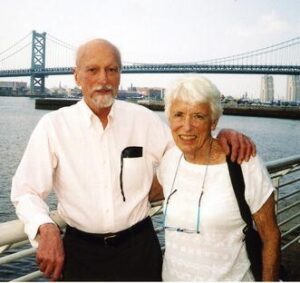Meet a Member: Dr. Hope Punnett

(photo by Tyger Williams, Philadelphia Inquirer staff photographer from a recent article about Dr. Punnett)
Friends Life Care has many amazing members who have done wonderful and impactful things in their life. Dr. Hope Punnett is a pioneer in pediatric genetics who has agreed to let us share a little bit about her life journey.
Geneticist Dr. Hope Handler Punnett
Dr. Hope Punnett is a professor emerita of genetics at St. Christopher’s Hospital for Children in Philadelphia, where she ran the genetics lab for over 30 years. She is also a mother, a grandmother, and a steward who advocated for the rights of children with genetic disorders.
 Dr. Punnett’s passion for genetics began when she was a young girl, fascinated by the patterns of inheritance in her family’s garden. She pursued her studies in biology and chemistry at Smith College, Yale University, and the University of Illinois.
Dr. Punnett’s passion for genetics began when she was a young girl, fascinated by the patterns of inheritance in her family’s garden. She pursued her studies in biology and chemistry at Smith College, Yale University, and the University of Illinois.
 During her time at Yale University, she met her future husband, Dr. Thomas Punnett, Jr. and they married in 1950.
During her time at Yale University, she met her future husband, Dr. Thomas Punnett, Jr. and they married in 1950.
They welcomed three daughters into their family over the years.
And together, they moved to Philadelphia where Hope joined the faculty of St. Christopher’s Hospital for Children and Thomas became a professor at Temple University.
Career at St. Christopher’s Hospital for Children
Dr. Punnett’s work at St. Christopher’s focused on diagnosing and treating children with rare and complex genetic conditions, such as Down syndrome, cystic fibrosis, sickle cell anemia, and many others. She also conducted groundbreaking research on chromosomal abnormalities, fetal genetic testing, and whole-genome analysis, publishing over 100 papers in prestigious journals. She collaborated with other experts in the field, both nationally and internationally, and mentored many young geneticists who followed in her footsteps.
Advocate for Children’s Rights
Dr. Punnett’s dedication to her patients and their families was remarkable. She provided compassionate and supportive genetic counseling, explaining the results of genetic tests and offering personalized recommendations for care. She also advocated for the rights of children with genetic disorders, fighting against discrimination and stigma in education, health care, and society. And she served on the local board of directors of the March of Dimes as well as several other professional Boards.
Dr. Punnett retired from St. Christopher’s Hospital for Children in 2010, but she remains active in the genetics community.
A Pioneering Super Ager
Dr. Punnett is a pioneer in pediatric genetics, a leader in her field, and a hero to many families. She has made countless discoveries and contributions to the understanding and treatment of genetic disorders, improving the lives of thousands of children.
And at 96 years of age, she is also a “super ager”. And as a geneticist and a super ager, she recently joined a new study on longevity.
What is a Super Ager?
You may have heard of super agers, people who are 95 years old or older and have cognitive function that is comparable to that of an average middle-aged person. They also have less brain volume loss than their peers, especially in regions that are important for memory, attention, and motivation. They are rare, but they exist, and they challenge the common assumption that aging inevitably leads to mental decline.
But what makes these super agers so exceptional? Is it genetics, lifestyle, or something else? And can we learn from them and apply their secrets to the general population?
What is the Super Agers Family Study?
These are some of the questions that researchers are trying to answer with the Super Agers Family Study, an ambitious new trial that aims to enroll 10,000 people who are 95 years old or older and their children. The study, a collaboration between Boston University, the Albert Einstein College of Medicine, and the American Federation for Aging Research, will compare the traits of super agers and their offspring to those of older adults whose parents were not super agers.
 Participants will provide saliva samples for DNA analysis, as well as general health information. The goal is to amass the largest data bank of super agers and unravel their genetic secrets.
Participants will provide saliva samples for DNA analysis, as well as general health information. The goal is to amass the largest data bank of super agers and unravel their genetic secrets.
The main hypothesis is that super agers have inherited rare genetic variants that confer exceptional longevity and resilience. By identifying these genes and understanding how they work, scientists may be able to develop drugs or interventions that mimic their effects and help more people enjoy longer, healthier lives.
Factors that Influence Longevity
However, genetics is not the only factor that influences longevity and cognition. Lifestyle factors, such as diet, exercise, social engagement, education, and mental stimulation, may also play a role in preserving brain health and function. Some studies have suggested that super agers tend to have positive personality traits, such as optimism, resilience, and curiosity. They may also have higher levels of social support and emotional well-being than their peers.
The bottom line is that there is no single formula for becoming a super ager. It is likely a combination of genetic luck and environmental factors that interact in complex ways. However, by studying these remarkable individuals, we may be able to uncover some of the mechanisms that delay or prevent age-related cognitive decline and apply them to the general population. As more people live longer, it is important to find ways to enhance not only the quantity but also the quality of life in old age.
Expressing Gratitude from Friends Life Care
Dr. Hope Punnett is an inspiration to all who know her, and a role model for future generations of scientists. Friends Life Care is appreciative of Dr. Punnett for sharing her story. And we are committed to her and all of the Friends Life Care members as they pursue aging in place in their own home.
